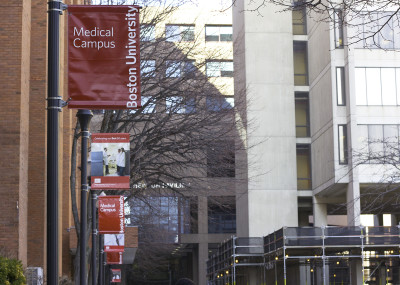
Boston University School of Medicine’s Alzheimer’s Disease Center and CTE Center announced Monday a partnership with senior living community Wingate Residences, using a new location at Wingate for research testing on one of the ADC’s ongoing studies.
The study, called Health Outreach Program for the Elderly (HOPE) Study, is a long-term project designed to monitor the correlation between memory and aging, according to its website. Research participants, who may or may not have memory issues, receive a neurological examination yearly either at the BU Medical Campus or at other satellite locations in Massachusetts. Wingate, a senior living facility in Needham, will be another satellite location for this study.
Robert Stern, the director of ADC Clinical Care and principal investigator of the HOPE study, said he is excited for new opportunities the partnership will provide HOPE, and is pleased with current progress being made with preparing the new satellite location.
“In addition to their facility already being beautiful, and their location being ideal, they’ve now gone ahead and renovated space to make it really specific for our research needs,” Stern said. “Very soon we’re going to start seeing research participants in this HOPE study at Wingate one day a week.”
Stern said the partnership will also increase educational and training opportunities for current staff and residents of Wingate.
“We will also be conducting lectures for their own residents as well as for the community,” said Stern. “We will be providing training for their staff, and they will help spread the word within their own residence and also in the local community about the importance to participate in research studies.”
Initial communication between BU’s ADC and Wingate began when Stern gave a talk at Wingate in September 2014, Stern said. Further talks on a formal affiliation between BU ADC and Wingate started in the spring of this year, he said.
“So there’s no set time [limit for this affiliation],” Stern said. “I’m hoping that this will be a terrific, productive and mutually fulfilling affiliation.”
Maria Lastoria, executive director at Wingate Residences, said the partnership is also expected to enhance the Memory Care 360 Program, which works to create a safe and nurturing environment for residents with cognitive impairment.
Echoing Stern, Lastoria also said that the Wingate community is “thrilled” to house the HOPE Study’s satellite location. She said the research will not only benefit the patients, but also those indirectly affected by the disease.
“Long-term, anyone that cares for someone with Alzheimer’s disease hopes that the work that is being done today will change the course of treatment for this devastating disease,” Lastoria said.
Several students reacted positively to the partnership and said that further research on Alzheimer’s disease should be a priority in the future.
Dyllon Carlson, a sophomore in the College of Engineering, said he believes that the partnership is an asset to the BU community.
“I think it’s definitely a good idea to help people who need it,” he said. “The more people we can help the better.”
Helena McCoy, a freshman in the College of Arts and Sciences, said the partnership will “greatly benefit” both BU and the Wingate Residences.
“[The partnership] will help the senior citizens there by providing new information and change from outside sources,” she said. “[The partnership] will also benefit BU because it gives them a better opportunity to work hands on with people for their research.”
Kaitlin Baumann, a freshman in the School of Education, said having a personal experience with Alzheimer’s has led her to realize the importance of research on the disease.
“I think it’s very important [to do research],” she said. “I know it’s a very serious thing and it affects a lot of families.”




